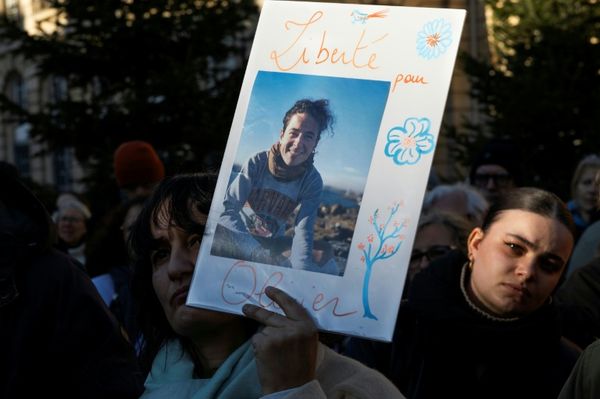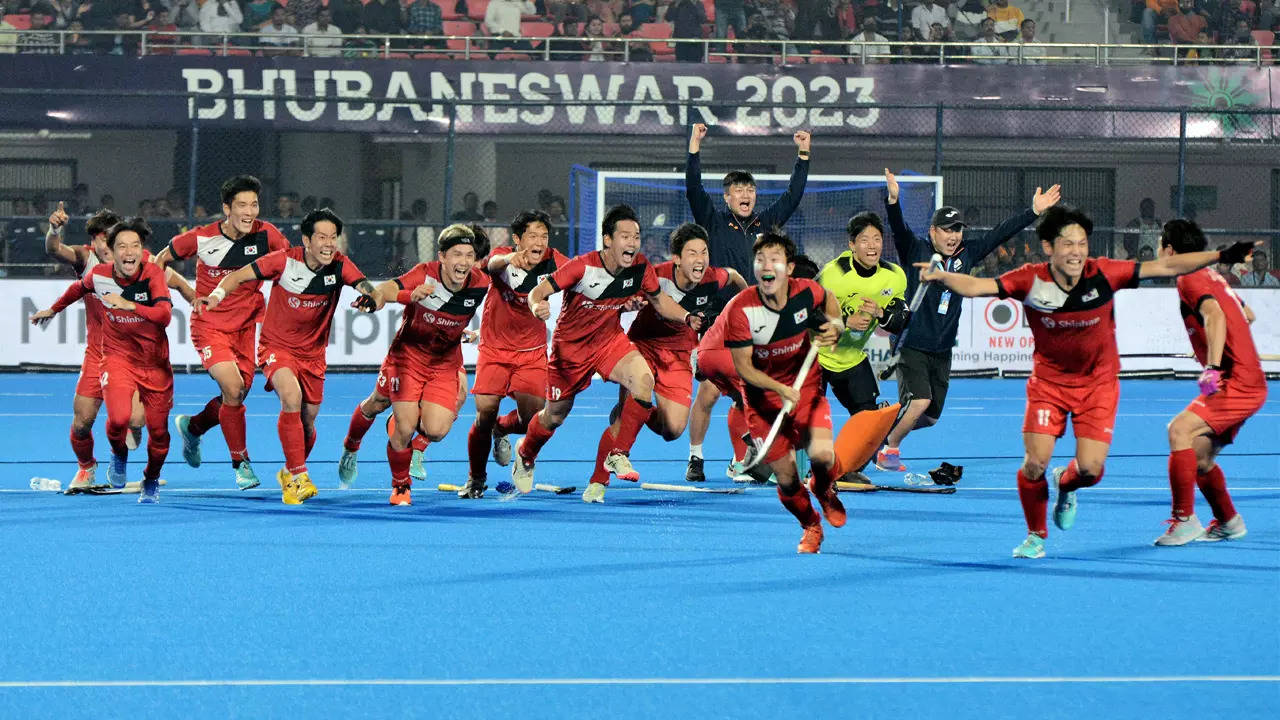
BHUBANESWAR: The South Korean celebrations continued even after the bulbs in the light towers of the Kalinga Stadium stopped burning on Monday. After failing to qualify for the last two Olympics and the 2018 World Cup, they are now the only Asian team left in the title race of the Men's Hockey World Cup.
The quicksilver Koreans, who were once the Asian team to beat and also the runners-up at the 2000 Sydney Olympics, are trying to regain lost ground, which only augurs well for the sport in the continent. By beating 2016 Olympic champions Argentina in the fashion that they did in the crossover match of the ongoing 2023 World Cup, South Korea have taken a major step in the direction of revival.
Behind by two goals until the final quarter began, the Koreans never lost their structure and belief led by their constant of two decades -- Jang Jonghyun, who drag-flicked his second goal in the 50th minute and was the central figure in a set-piece that was scored off with a variation.
The Argentines, leading 5-4 until four and a bit minutes on the clock, were caught napping against the nippy boys in red, who won 3-2 in the shootout. While the three other Asian teams in the tournament -- hosts India, Malaysia and Japan -- were left to lick their wounds in the placement games in Rourkela, the Koreans were celebrating their quarterfinal entry in Bhubaneswar.
They face the 2018 runners up Netherlands in their last-eight match on Wednesday.
"Who is it? Holland? Oooh, such a strong team," said coach Shin Seok-kyo, with the joy of making it to the quarterfinals writ large on his face as well as in the lighter tone of his remark.
Shin has lived through what South Korea is trying to regain in world hockey, leading the team's gold-medal run in the 1994 and 2002 Asian Games with his lethal penalty-corner shots, which also played a major role in the 1994 and 1999 Asia Cup triumphs.
Jonghun took over penalty-corner duties and has been ruling at the top of the D since Shin put his stick down in 2002. After the 2002 Asian Games gold in Busan, the consistency in South Korea's game started waning, to the extent that they missed the bus for Rio 2016.
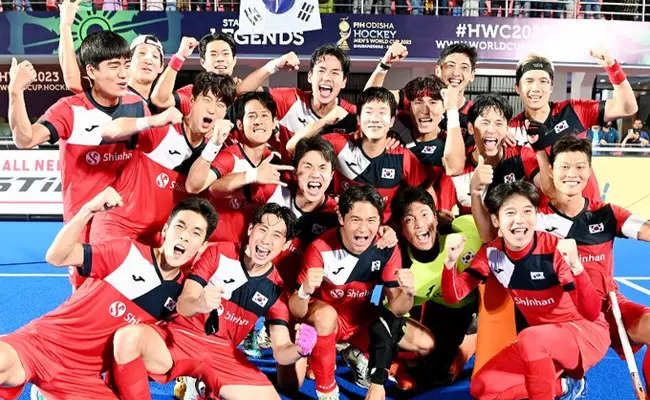
(Pic credit: FIH)
The drop in support for the game back home was one of the major reasons behind that.
"Korea is not interested in hockey. The sport is not famous," coach Shin dwelled upon the reasons for Korean hockey's fall.
The country never had enough supply of hockey players. The structure of the game has never been strong, but coaches like Shin have tried to make do with whatever is at their disposal.
“There are only four clubs in South Korea and five university teams," said Shin. "About 150-200 players," he added. That small number comprises the cream of hockey players in the entire country. The team for the World Cup in India has been picked from among those players.
"In our team, 14 players are playing their first World Cup. Five or six are experienced players," said Shin. "So we have a young team for the future. Our target is the Asian Games in Hangzhou (China) and the (Paris 2024) Olympic Games."
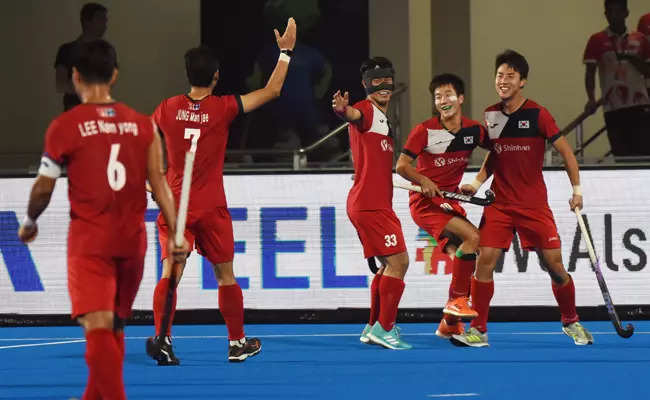
(TOI Photo)
Things have looked up for the team since 2021. They reclaimed the Asia Cup in 2022 after nine long years and in the year previous to that won the Asian Champions Trophy.
But it's never easy back home for the Koreans.
"There is no professional league. Four clubs contribute money - Seongnam City Hall, Incheon City Sports Association, Gimhae City Hall and Army," the coach added.
Middle school is when kids generally start playing hockey in South Korea and then graduate to high school where they continue with the sport
"There are 15 teams each (in middle and high school). Then they go to university where there are five teams. Some players then serve in the Army for two years. After that, some opt for clubs and some retire. Keeping the players together is very difficult," Shin said.
At those levels, Shin said working on the basic skills is his focus as a coach.
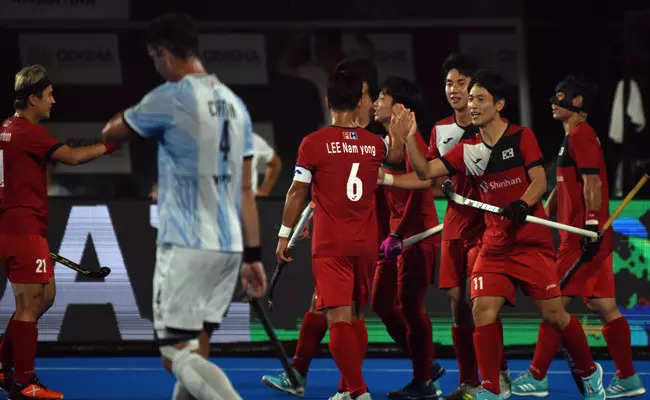
(TOI Photo)
"Ball control, open receiving, how to attack, how to defend."
Shin wasn't happy to see three Asian teams failing to make it to the quarterfinals.
"Very sad," he said. "India is Asia's leader, (Tokyo) Olympic bronze medallist, high-ranked team. Malaysia and Japan have also not made it to the quarterfinals. There was pressure (on S Korea against Argentina) as the only Asian team left."
That pressure will mount to another level on Wednesday in the quarterfinal against the Dutch.
But it was difficult to spot any nerves in Shin's words, for whom reaching the quarterfinals was his team's first objective before they started their journey in this World Cup after a gap of eight years.
"My boys are young. Some days they play very well and some days not so good. It will take some time...Maybe two or three years later, they will be experienced players," said Shin.
Slowly getting their mojo back, a win over Holland and a place in the semifinals against defending champions Belgium will be another giant step in South Korea's comeback story.
